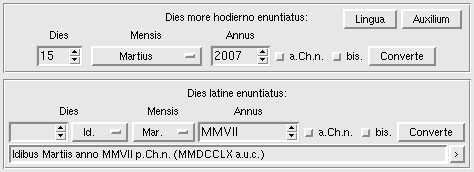March 15, 2007
The Ides of March

Today, in the Roman calendar, is the Ides of March. For those who have difficulty keeping track of the Roman date, there is a nifty little program called Kalendae by Roberto Ugoccioni that converts between modern and Roman dates. I've shown it above with its Latin interface, but if you prefer you can select another of the nine available languages.
The famous event that occurred on the Ides of March is of course the assassination of Julius Caesar, and the linguistic event associated with this is the utterance of Caesar's final words:
Et tu, Brute!
"You too, Brutus!". In fact, it may well be that Caesar never uttered these words. As I mentioned in my discussion of The Passion, upper class Romans all knew Greek well. Speeches in the Senate were made in Latin, but ordinary conversation, especially among intimates such as Caesar and Brutus, is believed often to have been in Greek. If Caesar actually said what is attributed to him, the words he used may well have been:
καὶ σὺ τέκνον
[kai sy, teknon].
Here is the passage from the historian Suetonius' biography of Caesar in which he describes Caesar's death:
Assidentem conspirati specie officii circumsteterunt, ilicoque Cimber Tillius, qui primas partes susceperat, quasi aliquid rogaturus propius accessit renuentique et gestu in aliud tempus differenti ab utroque umero togam adprehendit; deinde clamantem: "Ista quidem vis est!" alter e Cascis aversum vulnerat paulum infra iugulum. Caesar Cascae brachium arreptum graphio traiecit conatusque prosilire alio vulnere tardatus est; utque animadvertit undique se strictis pugionibus peti, toga caput obvolvit, simul sinistra manu sinum ad ima crura deduxit, quo honestius caderet etiam inferiore corporis parte velata. Atque ita tribus et viginti plagis confossus est uno modo ad primum ictum gemitu sine voce edito, etsi tradiderunt quidam Marco Bruto irruenti dixisse: καὶ σὺ τέκνον; Exanimis diffugientibus cunctis aliquamdiu iacuit, donec lecticae impositum, dependente brachio, tres servoli domum rettulerunt. Nec in tot vulneribus, ut Antistius medicus existimabat, letale ullum repertum est, nisi quod secundo loco in pectore acceperat.
As he took his seat, the conspirators gathered about him as if to pay their respects, and straightway Tillius Cimber, who had assumed the lead, came nearer as though to ask something; and when Caesar with a gesture put him off to another time, Cimber caught his toga by both shoulders; then as Caesar cried, "Why, this is violence!" one of the Cascas stabbed him from one side just below the throat.Caesar caught Casca's arm and ran it through with his stylus, but as he tried to leap to his feet, he was stopped by another wound. When he saw that he was beset on every side by drawn daggers, he muffled his head in his robe, and at the same time drew down its lap to his feet with his left hand, in order to fall more decently, with the lower part of his body also covered. And in this wise he was stabbed with three and twenty wounds, uttering not a word, but merely a groan at the first stroke, though some have written that when Marcus Brutus rushed at him, he said in Greek, "You too, my child?" All the conspirators made off, and he lay there lifeless for some time, and finally three common slaves put him on a litter and carried him home, with one arm hanging down. And of so many wounds none turned out to be mortal, in the opinion of the physician Antistius, except the second one in the breast.
Note that Suetonius, writing in Latin, quotes Caesar as speaking in Greek.
[Update: I've modified the above a bit because I have learned that the view that upper-class Romans routinely spoke Greek with each other, which is what I learned throughout my education, is not as firmly established as I had understood it to be. There is no question that they knew Greek well and could converse in it, but it is apparently not so clear that they did so as a matter of routine. Input from social historians is invited.]
Posted by Bill Poser at March 15, 2007 02:30 PM